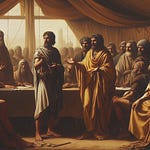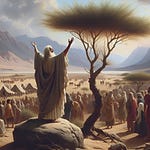Chapter Notes
Have you ever wondered just how far God will go to secure the deliverance of His own people?
In Exodus 11, God declares the final and most devastating plague—the death of the firstborn—that will compel Pharaoh to release the Israelites.
Commentary
vv. 1–3 - God declares that the death of the firstborn will compel Pharaoh not merely to let the Israelites go but to drive them out with urgency. He fulfills His covenant promise to Abraham that His people would leave bondage with “great substance” (Gen. 15:14). The wealth taken from the Egyptians is not an act of injustice; it is divine recompense for Israel’s long years of enslavement and a provision for their future worship. This plundering also shows God’s sovereignty over the hearts of the Egyptians, for they willingly gave their wealth (Prov. 21:1). Even Pharaoh’s servants come to esteem Moses. A dramatic reversal unfolds that vindicates God’s servants before their adversaries. This moment sets the stage for the Exodus, underscoring that God alone orchestrates the deliverance of His people.
vv. 4–8 - Moses warns Pharaoh of the coming death of every firstborn in Egypt—from the palace to the slave quarters, and even among livestock. The judgment is not arbitrary. It is a direct affront to Egypt’s gods and to Pharaoh’s own claim as a divine protector. The death of the firstborn symbolizes the ultimate consequence of sin—death—and highlights God’s sovereignty over life itself. In stark contrast to Egypt’s anguish, Israel experiences perfect peace—so much so that “not a dog is heard barking” against them (v. 7). This detail reinforces the completeness of God’s protection and the distinct separation between His covenant people and the world. Moses departs in righteous anger, his grief over Pharaoh’s obstinacy mingled with zeal for God’s glory.
vv. 9–10 - The chapter concludes by reminding us that Pharaoh’s defiance, though his own choice, was sovereignly used by God to display His power and to fulfill His redemptive plan. Pharaoh’s repeated refusal to obey set the stage for the climactic judgment and the ultimate deliverance of Israel. This interplay between human rebellion and divine sovereignty shows the futility of resisting God’s will and assures us that His purposes will always prevail.
Application
Parents Leave a Spiritual Legacy—Good or Bad. The judgment on Egypt’s firstborn starkly reminds us that parents’ choices shape their children’s spiritual destiny. Pharaoh’s rebellion brought devastating consequences for his nation, affecting families throughout Egypt. Similarly, Adam’s disobedience brought death to all (Romans 5:12), yet Christ’s perfect obedience brings life to all who trust in Him (Romans 5:19). Parents, your faith—or lack thereof—creates ripples that span generations. Every moment of prayer, every teaching of Scripture, and every act of love sows seeds with eternal fruit. Are you diligently cultivating a home that reflects God’s covenant faithfulness? And children, learn from this story. God sees and remembers the actions of families. Will you choose to follow the faithful example of those who truly love the Lord?
God Transforms Oppression Into Provision for Worship. The silver and gold taken from the Egyptians were more than mere reparations for suffering. They became resources for Tabernacle worship. What once symbolized bondage was transformed into an instrument of praise. This transformation shows how God redeems even the darkest seasons, using trials for His glory and our good (2 Cor. 4:17). Have you experienced suffering that seemed purposeless? Trust that God can repurpose your pain to fulfill His perfect will. The hardships meant to harm you can become testimonies of His grace and opportunities for worship when placed in His hands.
God’s Promises, Not Our Performance, Secure Salvation. Israel’s deliverance rested entirely on God’s covenant with Abraham—not on their righteousness or works. Even amid idolatry and rebellion (Ezek. 20:8), God acted according to His unchanging faithfulness. Likewise, our salvation rests on Christ’s finished work rather than our own merit (Eph. 2:8–9). This truth is profoundly freeing; it removes the burden of earning God’s favor and invites us to rest in His grace. Are you trusting in God’s promises, or are you still striving to secure your own salvation? Let this narrative remind you that salvation is entirely God’s work from beginning to end.
God’s Enemies Ultimately Glorify Him, Even in Their Rebellion. Pharaoh’s defiance magnified God’s justice and power. Even human rebellion, when placed in God’s hands, cannot thwart His sovereign purposes (Rom. 9:17). Every act of opposition became an opportunity for God to display His glory. This truth should embolden us when we face resistance or hostility. Do you trust that God is sovereign—even when His enemies seem to prevail? Take heart. God’s purposes cannot fail; every act of defiance ultimately reveals His greatness.
Prideful Resistance Ends in Ruin, But Humility Leads to Life. Pharaoh’s pride blinded him to the reality of God’s power, resulting in devastating judgment for him and his nation. Pride isolates us from God, hardens our hearts, and ultimately brings ruin (James 4:6). In contrast, humility opens the door to grace and life. Are there areas of pride in your life where you resist God’s authority? Surrender them today, bow before the King of kings. Teach your children that true blessing comes through humility, while pride only leads to destruction.
God’s Protection Is Complete and Absolute. The phrase “not a dog barking” against the Israelites vividly illustrates God’s sovereign care. Even in the midst of Egypt’s turmoil, God ensured His people’s peace and security. This detail reminds us that nothing happens apart from His control, and His protection covers every aspect of our lives. Believers, take comfort in Christ’s words: “No one will snatch them out of my hand” (John 10:28). Are you resting in the assurance of God’s protection, trusting that He is both willing and able to preserve you?
Christ, the Firstborn, Secures Our Redemption. The death of Egypt’s firstborn points forward to Christ—the ultimate Firstborn—who bore God’s wrath for His people. Just as the blood of the Passover lamb shielded Israel from judgment (Exodus 12), Christ’s blood shields believers from God’s wrath. He is the “firstborn of all creation” (Colossians 1:15) and the “firstborn from the dead” (Colossians 1:18), securing eternal life for those who trust in Him. Children, remember that Jesus is the perfect Lamb who gave His life so that you might live forever with God. Have you placed your trust fully in Christ, who bore the penalty for your sin? Today is the day to find refuge in His saving blood.
“To the righteous all things work together for good. Come foul, or come fair, all shall end well, every wave speeds him to his desired haven, and even the rough blast swells his sails, and drives him the more swiftly towards the port of peace. The Lord hath put a difference between Israel and Egypt in this world.” — Charles Spurgeon











